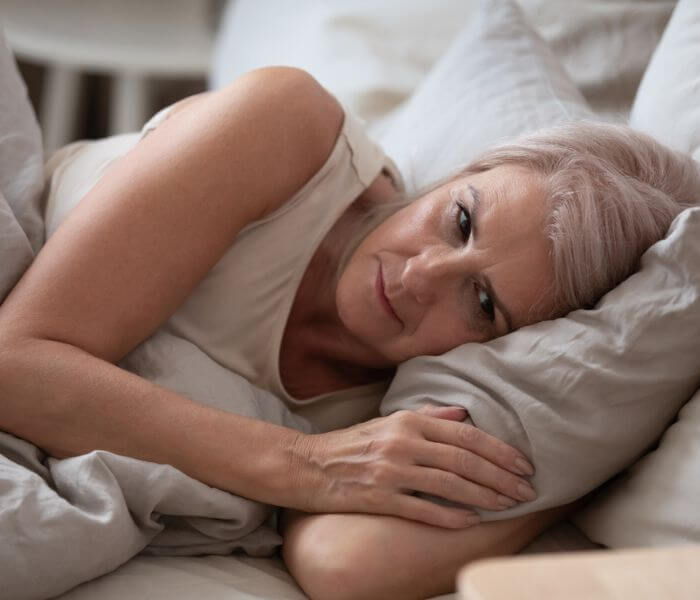5 mins read
What to expect from your sleep during menopause

Forth’s menopause expert, Dr Beverley Taylor, explains why you may be experiencing poor sleep during perimenopause and menopause and shares tips on how you can improve your sleep quality.
Why Can’t I Sleep Now I Am Perimenopausal?
Whilst it’s unrealistic to expect amazing sleep every night no matter what life throws at us, getting some degree of good quality sleep is important for our physical and mental functioning. But why then, as we head into perimenopause, does sleep take such a hit and how can we support ourselves to get the best night’s sleep possible during menopause?
Forth’s perimenopause survey found that almost 80% of us struggle with sleep disturbance during menopause.
Through my work, I’ve also spoken to numerous women struggling to sleep during menopause and they’ve all had similar sleep issues. Things like struggling to get to sleep or stay asleep, night-time waking around 3am from those troublesome night sweats or to use the toilet, or waking with anxious or negative thoughts. But whatever the reason for your disrupted sleep, it’s likely to be due to the changes in those lovely hormones – oh yes, them again!
What Hormones Impact Sleep During Menopause?
Oestrogen not only plays a role in the metabolism of serotonin and other neurotransmitters that affect our sleep-wake cycles, but it also helps to keep our body temperature low during the night which affects our quality of sleep.
As we move into our perimenopause, those declining oestrogen levels can impact both the length and quality of our sleep.
Progesterone also has a role in inducing sleep by acting on our brain pathways – it can help us to relax and get that lovely sleepy feeling, enabling us to drop off. Those declining levels in perimenopause can impact how easily we find it to fall asleep.
Finally, melatonin which is another big hitter amongst our sleep-inducing hormones declines with age, making it even harder for us to drift off. Melatonin may also be affected by our current lifestyles as the type of light emitted by phones, tablets and computers can suppress our melatonin production, especially if we watch or use these devices in the hour or so before bed. Add in a few wake-ups for trips to the toilet and a few sleep-disturbing night sweats and it’s easy to see why so many of us are struggling with sleep in the menopause!
How Can I Get More Sleep In Menopause?
Thankfully, I’ve helped lots of women to get a few more precious zzz’s and I can help you too! Yes, even if your hormones are feeling a bit all over the place.
- Create the right bedroom environment – we sleep better when our bed and bedroom are comfy and inviting and our bedroom is free from clutter. Think cave-like – cool, dark and calming. If you are struggling with night sweats, think about layering different blankets or having blankets you can pull on and off during the night, use cooling fabrics for sheets and nightwear and have a fan within easy reach to switch on as needed.
- Create a calming wind-down routine that makes you feel good to remind your body it’s time for bed. Try reading, journaling, or meditation in the hour or so before bed. Try to avoid scrolling social media or using your phone as these wake your brain up and can lead to more frequent night-time waking.
- Create a consistent sleep schedule that works for you – focus on going to sleep and waking up at the same time every day so your brain and body know what’s expected and when.
- Develop a few strategies for getting back to sleep once woken – have a journal by the bed to jot things down to stop them rattling around your head, play some meditation music or white noise to distract your brain from any night-time worries or anxieties, or focus on deep breathing and muscle relaxation to lull your body back to sleep.
- Avoid caffeine, alcohol or smoking late in the evening as these all stimulate your body into the opposite of sleep.
- Focus on hydration during the day – if night-time trips to the toilet are an issue, try to limit the amount you drink in the hour or so before bed and visit the toilet right before you settle down to sleep.
- Spend time outside each day, preferably first thing in the morning – this helps to trigger our morning cortisol release and regulate the different hormones involved in sleep.
- Move your body every day – whether that’s at the gym, a walk, a run, household chores or simply dancing around the living room. Try not to do too much exercise late in the evening as our body needs time to come back to normal after exercise before it can settle down to sleep.
- Focus on having a good bed-sleep connection – try to use your bedroom for sleep and intimacy only and keep work or technology in another room (phone, laptops and TVs). This helps the brain to understand when you go to bed, it’s to go to sleep.
- Add a sleep spray into your night-time routine – these often include Lavender to help the brain calm for sleep.
Boosting sleep can also support those troublesome menopause symptoms of brain fog, memory, concentration, maintaining a healthy weight, anxiety and mood.
Will My Sleep Get Better After Menopause?
The good news is that many sleep issues resolve as the hormones settle to their new level post-menopause and things feel a bit more like ‘normal’.
You may also find your sleep disruption comes and goes as you move through the menopause transition, so if you are struggling with your sleep now, it may not always be the case.
Remember, you can return to these tips for a good night’s sleep at any time if sleep becomes more of an issue.
Does HRT Help With Sleep?
Hormone replacement therapy (HRT) can be particularly helpful for those struggling with menopause-related sleep disruption as it balances those oestrogen and progesterone levels.
There are pros and cons to HRT and you should speak to your healthcare provider about them. You can find more information about HRT in our guide to hormone replacement therapy.
This information has been medically reviewed by Dr Thom Phillips
Thom works in NHS general practice and has a decade of experience working in both male and female elite sport. He has a background in exercise physiology and has published research into fatigue biomarkers.

Dr Thom Phillips
Head of Clinical Services
Related articles
Like this article? Here are some more based on similar topics.



